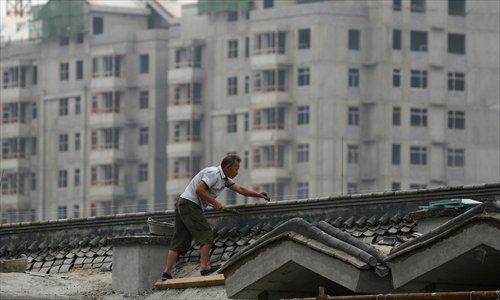Growth slows for 2nd straight quarter

A Chinese man works on the roof of a building at a construction site in Beijing on Sunday. In the first half, the total investment in real estate development rose by 20.3 percent year-on-year, 0.1 percentage points higher than that of the first quarter. Photo: AFP
China's economic growth has slowed for a second straight quarter this year, adding to pressure on the government to speed up long-term reforms and restructuring to unleash growth potential.
The country's GDP grew 7.5 percent from a year earlier in the second quarter, down from the 7.7 percent in the first three months of the year, data from the National Bureau of Statistics (NBS) said Monday.
The figures brought China's GDP growth to 7.6 percent year-on-year in the first half of the year, above the 7.5 percent growth target for the year and in line with market expectations.
"Overall, the economy has run in a stable manner in the first half. Major indicators are still within the reasonable range expected at the beginning of the year," Sheng Laiyun, spokesman for the NBS, said during the release of the data Monday.
The slower growth in the second quarter is a reflection of a decline in potential productivity, a complicated international environment and a result of regulation by the government, Sheng said.
"The economic downward pressure adds to the need to speed up reform and economic restructuring to unleash potential that is still profound in China," Xu Hongcai, director of the Department of Information under the China Center for International Economic Exchanges, told the Global Times.
In the past, whenever the economy slowed down, the government stepped in with stimulus to revive the economy. However, the new leadership has been reluctant to fuel growth by easing monetary policies this time, but emphasized the economic restructuring to rebalance the economy away from over-reliance on exports and investment to a consumption-driven model.
The government's stance has led economists at Barclays Capital to coin the term "Likonomics" to describe a raft of measures adopted by the State Council led by Premier Li Keqiang. Deleveraging, avoiding stimulus and structural reform are considered to be the three pillars of "Likonomics."
There are also concerns among investors that China's economy may risk further slowing down without stimulus and China may miss its annual growth target for the year.
"There is a misunderstanding in the market about the policy stance of the new leadership. The government is not practicing economic shock therapy by simply standing by to deliberately overlook a slowdown," Xu said, noting "it is balancing economic restructuring and stabilizing growth."
The premier said last week that the government will focus on restructuring and advancing reforms as long as the economic growth rate, employment and other indicators don't fall below the lower threshold and inflation doesn't rise beyond the upper threshold.
Li did not specify the lower threshold but some economists believe a 7 percent GDP growth will be enough to keep jobs.
"It is difficult to gauge the real tolerance level of the new leadership to accept short-term pain. But once they have chosen to walk the path of structural reform, there is no course reversal," Chris Leung, a senior economist at DBS Bank, said in a research note sent to the Global Times Monday.
Monday's data showed China's retail sales, a measure of consumer spending, grew 12.7 percent year-on-year in the April-June period, up 0.3 percentage points from the first quarter. In June alone, retail sales rose 13.3 percent from a year earlier, the fastest growth since the beginning of the year.
"There is no difficulty for the government to achieve its annual growth target this year as consumption has grown steadily since the second quarter," Zhang Liqun, a research fellow at the Development Research Center of the State Council, told the Global Times.
Despite the protracted slowdown, executives of some multinational companies have expressed confidence in China's economy.
"We remain very optimistic about the future of China," DuPont Vice President William S. Niebur told the Global Times in an exclusive interview at the APEC China CEO Forum in Beijing Saturday.
"The economic growth at the current level may not be as high as before, but is still very strong globally and is still providing our business with significant opportunities to invest, grow and partner," Niebur said.